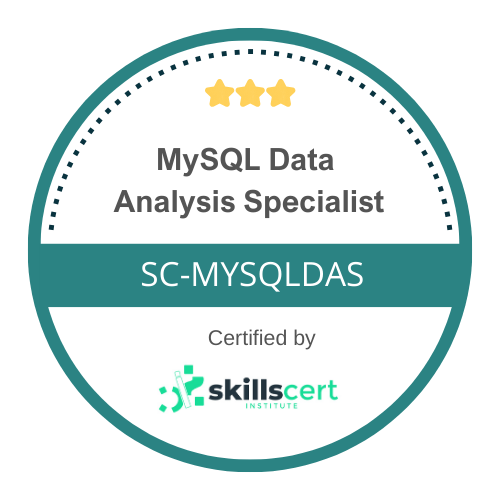0
MySQL Data Analisys Specialist SC-MYSQLDAS
$200.00
In stock
Product Details
MySQL Data Analysis Specialist
Certification Code: SC-MYSQLDAS
The MySQL Data Analysis Specialist(SC-MYSQLDAS) certification validates advanced data handling and analytical capabilities within MySQL environments, with a strong emphasis on ETL (Extract, Transform, Load) processes and data-driven decision-making. Based on MySQL 8, this certification ensures that candidates are equipped to design and execute robust data analysis workflows using native MySQL features, tools, and integration with BI platforms.
Core Competency Areas
1. MySQL for Data Analysis: Capabilities and Architecture
- Understanding the core features of MySQL 8 for data processing and analysis.
- Leveraging MySQL tools(e.g., Workbench, CLI, connectors) for effective data exploration.
- Comparing MySQL’s analytical capabilities with distributed systems like MapReduce, identifying strengths, limitations, and ideal use cases.
2. Installation and Configuration
- Installing MySQL on various operating systems (Windows, Linux, macOS).
- Configuring MySQL for security, performance, and storage efficiency.
- Managing configuration files (
my.cnf,my.ini) and setting runtime variables.
3. MySQL Workbench and Database Management Tools
- Utilizing MySQL Workbench for schema design, query development, and performance monitoring.
- Familiarity with alternative MySQL-compatible tools and GUIs for efficient database administration.
4. CRUD Operations and Query Fundamentals
- Executing CREATE, READ, UPDATE, DELETE operations across tables.
- Designing and running queries using SELECT, including filters (
WHERE), ordering (ORDER BY), and field selection. - Using GROUP BY, aggregate functions, and JOINs to extract meaningful insights.
5. ETL Processes and Data Integration
- Designing and implementing ETL pipelines to migrate data from external sources to MySQL.
- Applying transformation rules and business logic to incoming datasets.
- Ensuring data integrity and consistency during transformation and loading stages.
- Conducting data validation and cleansing to maintain high data quality throughout the pipeline.
6. Intermediate and Advanced Querying
- Using CASE statements and conditional logic in complex queries.
- Applying window functions(
ROW_NUMBER,RANK,LEAD,LAG) for advanced calculations. - Writing queries that store results into temporary or reporting tables for further analysis.
- Handling JSON and array-like structures natively within MySQL.
7. Query Optimization
- Optimizing query performance through indexing strategies and query restructuring.
- Interpreting execution plans
using
EXPLAINto identify inefficiencies. - Fine-tuning SELECT statements, joins, and subqueries for speed and scalability.
- Managing statistics and avoiding common performance pitfalls.
8. Data Visualization and Reporting
- Generating reports directly from MySQL using well-structured SQL queries.
- Integrating MySQL with data visualization platforms like Tableau, Power BI, or Grafana.
- Creating interactive dashboards to communicate analytical results clearly and effectively.
9. Troubleshooting and Best Practices
- Diagnosing and resolving common issues in data analysis queries.
- Applying best practices for analyzing large-scale datasets and managing analytical workloads.
- Ensuring data security, privacy, and integrity during the analysis process.
- Documenting analysis procedures and implementing audit trails where necessary.
This certification positions professionals to operate as data analysts, BI developers, or data engineers within organizations that rely on MySQL for data storage, transformation, and insight generation.
MySQL Data Analisys Specialist SC-MYSQLDAS
Display prices in:
USD


